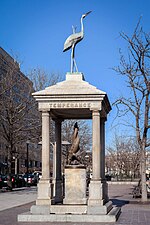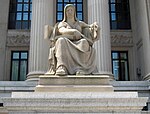Equestrian statue of Winfield Scott Hancock
1896 sculpturesBronze sculptures in Washington, D.C.Civil War Monuments in Washington, D.C.Equestrian statues in Washington, D.C.Historic district contributing properties in Washington, D.C. ... and 5 more
NRHP infobox with nocatOutdoor sculptures in Washington, D.C.Penn QuarterPublic art stubsSculptures of men in Washington, D.C.

General Winfield Scott Hancock is an equestrian statue of Winfield Scott Hancock, by Henry Jackson Ellicott together with architect Paul J. Pelz. It is located at Pennsylvania Avenue in United States Navy Memorial Park at the northwest corner of 7th Street, Northwest, Washington, D.C. It was commissioned on March 2, 1889, and dedicated on May 12, 1896, by president Grover Cleveland. It cost $50,000.The statue is a contributing monument to the Civil War Monuments in Washington, DC, of the National Register of Historic Places. The statue is featured in the opening of the Netflix series House of Cards.
Excerpt from the Wikipedia article Equestrian statue of Winfield Scott Hancock (License: CC BY-SA 3.0, Authors, Images).Equestrian statue of Winfield Scott Hancock
Pennsylvania Avenue Northwest, Washington
Geographical coordinates (GPS) Address External links Nearby Places Show on map
Geographical coordinates (GPS)
| Latitude | Longitude |
|---|---|
| N 38.893738888889 ° | E -77.022255555556 ° |
Address
General Winfield Scott Hancock
Pennsylvania Avenue Northwest
20004 Washington
District of Columbia, United States
Open on Google Maps










